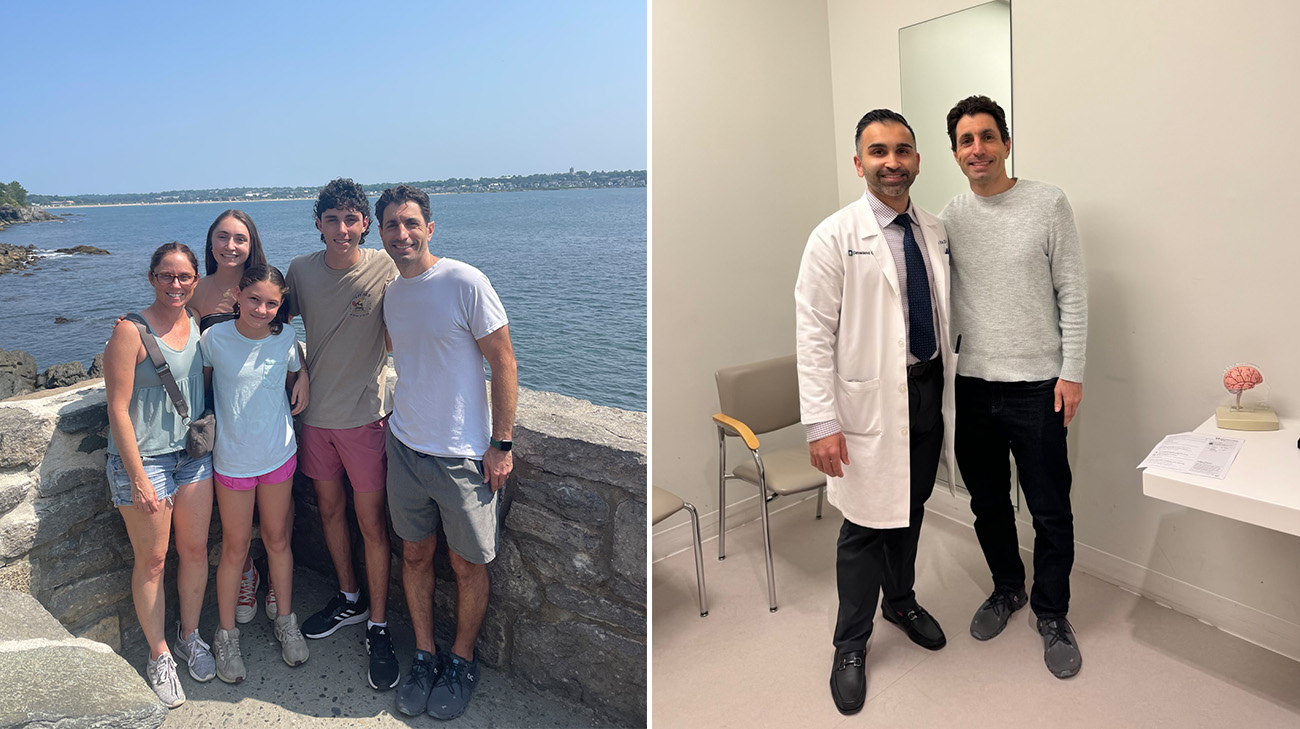
Frank, a 44-year-old husband and father of three, had been having seizures periodically for at least 20 years. It may have been longer, he said, but he didn’t pay close attention to them until he was out of college and on his own.
Frank’s seizures were “absence” seizures, also called petit mal seizures, which are less perceptible than other types seen in people with epilepsy. Rather than experiencing uncontrolled, jerking movements of the body, Frank would “blank out” for a short time, unable to process anything with his mind. To others it would look like a blank stare.
“I knew when a seizure was coming on and after it was over,” Frank says, “During it, though, my mind was like the wheel spinning on the computer. I never passed out, but nothing made sense in my mind.”
The seizures were a little scary, he says, and he only told close friends and family about them for fear of what other people might think.
Frank had seen several doctors and undergone testing that revealed the seizures were caused by a cerebral cavernous hemangioma – an abnormal tangle of tightly packed thin-walled capillaries in the brain. The hemangioma in his brain was located in the left temporal lobe, the part of the brain that is responsible for language, among other things.
Though his doctors prescribed medications to control the seizures, it would help for a while, but eventually the seizures would begin again. Every time he had a seizure, he had to stop driving for about six months while he adjusted to a change in medication. Not being able to drive “was the worst part,” he says. As a salesman who was on the road a lot, it was very inconvenient.
“There is nothing worse than being told you can’t drive,” Frank says. “It is like having your freedom stripped.”
He had talked with his doctors about having surgery to remove the hemangioma but was told he would first need to have a device implanted on his brain to gather more information about the seizures. He was reluctant to undergo multiple brain surgeries, so he did not pursue it further.
Frustrated, Frank acted on a recommendation from a friend who had been to Cleveland Clinic Weston Hospital for a neurological condition. He made an appointment to see Badih Adada, MD, a neurosurgeon who specializes in epilepsy surgery.
“I was not nervous at all. In fact, I was really looking forward to it.”
After meeting with Frank and reviewing his medical history, Dr. Adada was confident he could treat him. Dr. Adada introduced Frank to Samer Riaz, DO, a neurologist at Weston Hospital, the same day.
“I could tell when I met them that they would help me. They were both really engaged with me,” Frank says. “It was a fresh experience.”
Drs. Riaz and Adada reviewed Frank’s medical history and test results and had some tests redone.
“When Frank came to see us, he had been evaluated at several facilities,” Dr. Riaz says. “We did extensive testing, repeating all the imaging studies, and found that two areas of his brain were affected.”
They determined they could do the surgery based on information from the tests, without the need to implant a device first.
“We felt confident we had determined the area of the brain from which the epileptic discharges were coming,” Dr. Riaz says. “We would be able to treat Frank’s condition with only one surgery versus three.”
In September of 2022, Frank underwent the surgery.
“I was not nervous at all. In fact, I was really looking forward to it,” he says. “I really saw this as a resolution to what I had suffered from for so long.”
And a resolution it was. Frank is slowly tapering off all of his medications and Dr. Riaz says he expects he will not need any of them by the end of this year. Perhaps even better, Frank has not had a single seizure since the surgery.
“We were able to remove the vascular malformation within the epileptogenic zone to stop the seizures and preserve the function of that part of the brain,” Dr. Adada says.
The most challenging part, Dr. Riaz says, was that Frank had two brain lesions and they needed to sort out which was the source of the seizures.
“We have extremely precise tools to localize where the seizures are coming from,” Dr. Adada says. “Many patients are concerned about the cognitive cost of having surgery – what will happen with their personality, memory, or thinking. At Cleveland Clinic Florida we have the expertise and skill to offer epilepsy surgery safely and stop the seizures.”
He adds that epilepsy surgery “is not anything new.”
“This is something that has been around for 50 years,” Dr. Adada says. “Our understanding of epilepsy has evolved significantly.”
There are multiple techniques available for this type of surgery, including minimally invasive and robotic surgery.
Dr. Riaz says that he understands the fear people may have of brain surgery, but the risk of the surgery now is lower than the risk to neurologic function of not having it. He advises people who are considering epilepsy surgery to seek a second opinion at a healthcare center like Cleveland Clinic Florida.
Frank says he is glad he did.
“I really appreciate all that the team at Cleveland Clinic did for me,” he says. “They were all awesome. I’m grateful to have my life back.”
Related Institutes: Neurological Institute

